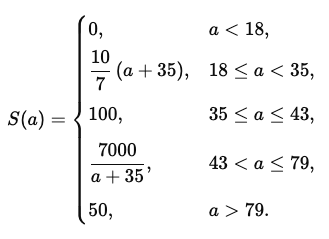
Today, as with all election days, I waited in line and internally judged all the decrepit husks of barely-living people around me and wondered why they should have a hand in forming government policy when they probably wouldn’t live through the term. Many of them couldn’t walk, hell-several of them couldn’t even breathe on their own without compressed oxygen. Yet they get a say in how future generations will live.
Why? I don’t presume to know, so I’ll defer to a historical political precedent for a reference point: age requirements for political offices. Specifically, the POTUS, which maintains a minimum age of 35. Apparently when this rule was enacted, it was done so on the grounds that an unquantifiable degree of experience that could only be obtained through living long enough should be in the candidate’s background.
Conversely, while minimum age requirements remain in effect, maximum age restrictions for political office remain primarily absent. Apart from the fact that people eventually die.
So I’m going to call out a number of inferred points:
- Life experience is needed to make good political decisions
- 18 is the minimum age requirement to officially make any political decisions
- 18 is therefore the publicly-accepted minimum life experience requirement for politics
- 35 is the minimum age requirement to hold the office of the US Presidency
- 35 is therefore the minimum age requirement to officially make political decisions of the greatest import
- 43 is the age at which a president will enter the last year of a second-term presidency (assuming they’re sequential, which they usually are)
- 43 is therefore the maximum age at which we expect the president to be fully competent to make the most important political decisions
- Death is the ultimate limiter for making any political decisions
- 79 is the current American life expectancy
Therefore 18 to 79 is the age range in which we can make political decisions, with 35 being the age at which we are qualified to make the most important political decisions.
Next point to consider: does this mean that 35 to 79 is the period in which we are fully suited to making the most important political decisions? Cognitively-speaking, the jury is out on that. Without citing specific sources, I’ll say that from the studies I’ve seen reported, peak intelligence occurs earlier in life, with some mental decline thereafter, but long term memory stays intact and contributes to total intelligence until dementia sets in. So rather than argue for a specific age limit on voting or holding office, which no one has agreed on yet, I’ll make a simpler point:
- Who is most impacted by our voting decisions?
Or rather: younger people have to live longer with a political decision unless a future vote changes the policy.
More pragmatically: if we all vote in our own self-interest, we have less time to benefit from doing so as we get older, and any such policies enacted in this space of time will be of greater impact to those who are younger. Once we hit the age of average life expectancy, it’s a crapshoot how long we’ll live to see the results of how we vote.
Now to the point. I will offer a final formula that weighs an individual’s vote based on age, with the following criteria (that’s right-it’s a Quantitative Philosophy post!):
- 18 and under: static weight of 0% since you can’t legally vote yet.
- 18-35: increasing weight to account for increasing experience, culminating in a maximum weight of 100% at age 35, the age we decided as a country that you have sufficient life experience to hold the highest political office and make the most impactful decisions.
- 35-43: the tenure period for a sequential two-term presidency, which assumes this is the age range during which someone is most qualified to make the most impactful political decisions-therefore a static weight of 100%.
- 43-79: decreasing weight to account for the decrease in time that we have left alive, corresponding to how many years we potentially have left to live under any new political policy changes.
- 80+: static weight of 50%. At this point you’re still entitled to vote, but the uncertainty of living to see the impact of your voting should greatly limit how much your vote counts.
Formula (in Excel format, because I work in finance and that’s the format I know):
For: age = X
=IF(X<18,0,IF(X>79,50,IF(X<35,100*(X+35)/70,IF(AND(X>=35,X<=43),100,100*1/((X+35)/70)))))
I’m 39 and my vote should count as 100% of one vote (for now). The kid in highschool gets counted as 76% of a vote. A new retiree is counted as 69% of a vote. And that old geezer on oxygen and living on Medicare and Social Security gets counted as a half vote.
Live in the present and shape the future, but then abdicate it to those who follow.
(Oh, and no one’s using abortion as birth control…whatever the fuck that means.)
–Simon

